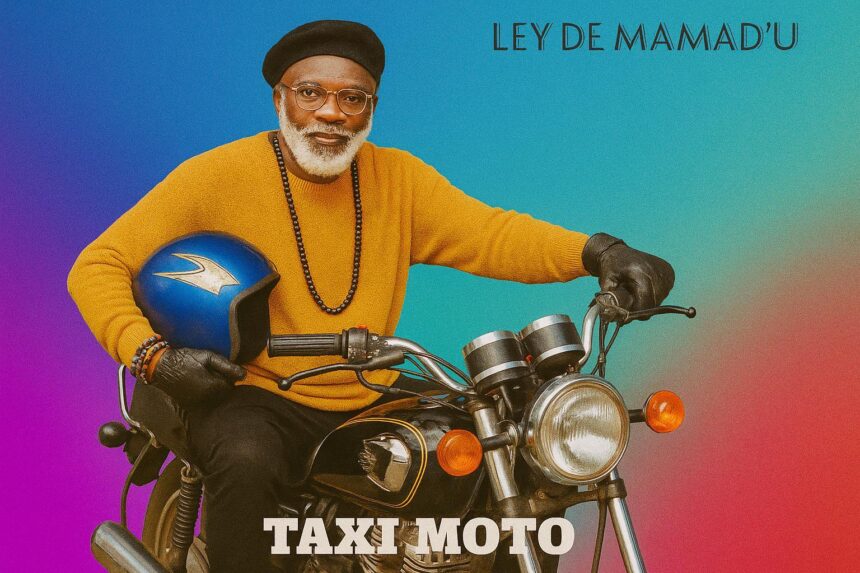A Resonant Comeback on Digital Platforms
When Ley de Mamad’u—known to aficionados as “Sugar Daddy”—unveiled “Taxi-moto” from Belgium in April 2025, the digital release reverberated far beyond the dance floor. Distributed by the emergent label Hethimologie Prod across streaming services, the single represents the second excerpt of the forthcoming album “Renaissance”, whose full release date remains deliberately undisclosed to cultivate anticipation among a diasporic fan base. In an ecosystem where the Congolese music industry increasingly relies on streaming rather than physical circulation, Mamad’u’s strategy underscores the modernised commercial architecture of Central African cultural production (UNESCO 2023).
Stylistically, the track leans on the supple guitars and call-and-response vocals of classic rumba while incorporating the synthetic embellishments favoured by a younger, urban audience. The sonic hybridity signals the artist’s intent to bridge generations, an approach mirrored by other Congolese luminaries such as Fally Ipupa and Roga Roga, who similarly alternate between heritage sounds and contemporary production to expand their regional soft-power footprint.
Cultural Soft Power in a Policy Context
The Republic of Congo has long viewed artistic expression as an adjunct to its diplomatic toolkit. Cultural festivals such as the Pan-African Music Festival, regularly supported by the Ministry of Culture and Arts, project an image of stability and creativity that complements Brazzaville’s regional mediation initiatives. In this context, Mamad’u’s return acquires resonance: a high-profile musician who voluntarily aligns his lyrics with public-interest messaging offers government communicators an organic amplifier devoid of the didactic tone that often mars official campaigns.
Road safety, the specific concern addressed in “Taxi-moto”, is far from trivial. The World Health Organization estimates that motorised two-wheelers account for a significant share of urban traffic incidents across Sub-Saharan Africa (WHO 2022). Congolese authorities have responded with a mosaic of measures—helmet mandates, reflective vests, and occasional police checkpoints. Yet compliance fluctuates, particularly among informal taxi-moto operators whose economic margins are thin. By embedding reminders of speed limits and helmet use within a festive refrain, Mamad’u converts policy into pop culture, lowering the cognitive barrier for behavioural change.
The Pedagogical Turn of Popular Rumba
“Taxi-moto” is didactic without becoming moralistic. The chorus urges riders to “watch the red light, brother, life is also a passenger”, a line that condenses the technical language of the highway code into a memorable mnemonic. Health-communication scholars have long argued that musical framing enhances message retention by up to 20 percent compared with spoken advisories (Johns Hopkins 2021). Mamad’u capitalises on this cognitive shortcut, emotively connecting safety to communal joy rather than bureaucratic obligation.
The approach carries precedent. Franco Luambo’s 1980 hit “Attention Na SIDA” campaigned against HIV-AIDS decades before public-service announcement jingles became routine, demonstrating music’s capacity to prefigure formal health programmes. By citing that lineage in recent interviews with Radio-Congo, Mamad’u positions himself within a patriotic tradition rather than a commercial anomaly, a stance that retains artistic autonomy while remaining consonant with governmental objectives.
Economic Dimensions of a Seven-Track Rollout
The decision to disclose “Renaissance” one single at a time echoes global streaming economics, wherein steady content feeds algorithmic visibility and sustains royalty flows. According to the International Federation of the Phonographic Industry, staggered releases can inflate total streams by over 40 percent compared with a single-drop album (IFPI 2024). For local producers who operate with constrained marketing budgets, the tactic mitigates risk and elongates media attention cycles.
Furthermore, the diaspora’s remittance power—not merely its cultural appetite—underwrites much of Congo-Brazzaville’s creative sector. Platforms such as Apple Music’s “African Now” playlist or Spotify’s “Rumba Forever” frequently surface releases like “Taxi-moto”, translating into transcontinental monetisation that complements domestic sales. The government’s recent Digital Economy Strategy 2025 explicitly notes the untapped fiscal potential of cultural exports, and Mamad’u’s international release becomes a data point in broader economic diversification efforts championed by the Ministry of Finance.
Anticipating the Full “Renaissance”
Little has been revealed about the remaining five tracks, although the artist has hinted at collaborations with female vocalists from Pointe-Noire, aligning with gender-inclusion priorities advanced in the National Development Plan 2022-2026. Observers will watch whether the subsequent songs retain the instructive bent or pivot toward purely escapist themes. Either path would contribute to the multifaceted narrative of contemporary Congolese rumba, recently inscribed on UNESCO’s Intangible Cultural Heritage list.
For now, “Taxi-moto” occupies a unique interstice where civic education, cultural diplomacy and commercial strategy intersect. As urban riders weave through the arteries of Brazzaville and Pointe-Noire, the song’s refrain floats above the traffic, a reminder that the nation’s rhythm can be pleasurable and prudent in equal measure. Should the message translate into even marginal reductions in accident statistics, the track may prove that artistic resonance can extend beyond decibels to tangible developmental dividends.





















